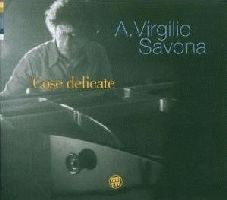 |
|
Amiata BSIN01984982 Savona, A. Virgilio - Cose Delicate With and without the Quartetto Cetra, with and without Lucia Mannucci, the story of Virgilio Savona’s artistic career covers half a century of such ingenious and multifaceted activity that it was with great pleasure and admiration that the Club Tenco chose to dedicate the 2004 Rassegna della canzone d’autore at Sanremo to him. A tribute that has also and above all served to draw attention to a little-known range of politically engaged, provocative and satirical songs which are now presented on this album, with the addition of a couple of previously unrecorded ones (“Il formichiere” and “Dietro le quinte”).
In fact, after revolutionizing the Italian song with his irony and swing back in the forties, creating for the quartet an enormous repertoire of which Virgilio was chiefly responsible for the music (with sparkling rhythms and a felicitous vein of melody), producing hit after hit, contributing to the emergence of television programs of a quality that would be inconceivable today and developing such imaginative genres as parody, children’s songs and the “metasong,” from the mid-sixties onward Savona’s production began to include more “committed” songs, as they were called at the time.
This culminated in the crucial watershed of 1969, when he wrote all the lyrics and music for a record that was highly critical of contemporary society, Pianeta pericoloso(“Dangerous Planet,”). Some of the songs on the album were performed by Corrado Paniand others by an unassuming university student, Odìs Lévy. The next step was a magnificent one: Virgilio adapted texts by Latin authors and set them to music, entrusting them to Giorgio Gaber for an LP with the eloquent title "Sexus et politician".
In 1972 he entered the field as a singersongwriter in his own right, openly political and antimilitaristic in his attitude: this was the album "E' lunga la strada" (“The Road Is Long”).
Over the following years Virgilio produced a whole series of politically and socially engaged records, including collections of songs about emigration, exile and lagers.
Another important disc on which he worked was the one by the singer Jemima in 1973, for which he adapted lyrics by Ignazio Buttitta and the French singer-songwriter Claire Charasz, among others, setting them to music. But from this time on there were many LPs of quality on which he worked as producer or arranger, in collaboration with the publisher Mario De Luigi. Among the most significant were Dania’s "Son' sempre io la donna", "Margot’s Sul cammino dell’ineguaglianza" and "La follia", Mannucci’s Canzoni da battello del Settecento veneziano, Franco Trincale’s "Siamo uguali alla catena" and Michele L. Straniero’s "La Madonna della Fiat".
In 1988, he would go on to set some of the latter’s caustic and poetic lyrics to music. They were recorded by Straniero himself in the collection Piccolo cabaret teologico-politico, finally brought out on CD in 2003.
In 1973, however, came another radical change: always interested in songs for children, Savona chose to take them to a new level by setting the nursery rhymes of Gianni Rodarito music and singing them on an album with Lucia. This would earn him a prestigious commission from the Maggio Musicale Fiorentinoto set more of Rodari’s texts to music, leading to the composition of the splendid "Opera delle filastrocche" (“Nursery-Rhyme Opera”).
This genre of children’s songs – to lyrics by Savona and Mannucci themselves, as well as Tata Giacobetti and the poet Dania Lupi– would continue with other works, often published in support of illustrated books.
In the same field Savona was to produce a number of other fundamental collections, on record and in printed form, but all drawing on the heritage of the folk tradition.
It is clear that Virgilio Savona has not neglected anything, from the commercial song to diatribes against the ills of society, from self-mockery to intellectual cabaret, from swing to folk, from flamenco to twist and from tango to disco.
A half-century of Italian music has passed through him. With some prescient flashes of inspiration: such as when in “Se il jazz fosse nato a Roma” he predicted the birth of what was to become the popular orchestra of the Testaccio, or when in 1954 he published a satirical song whose title says it all: “Troppi affari, Cavaliere!”* (Enrico de Angelis artistic director of the Club Tenco )
19 Tracks.
Price:
21,50 EUR

|
|